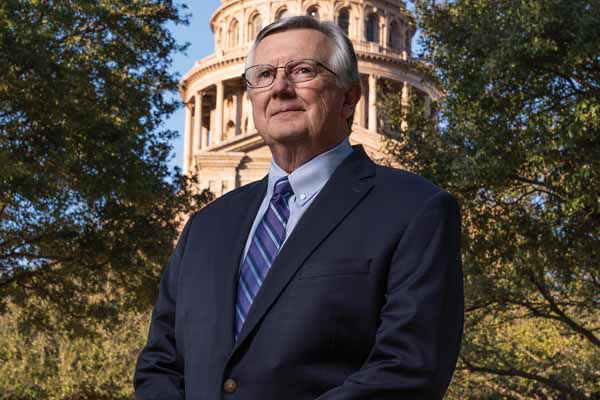
Less than a month into his tenure as the Texas Medical Association’s 157th president, Corpus Christi pediatrician Gary W. Floyd, MD, faced a shocking act of violence: the May 24 mass shooting at Robb Elementary School in Uvalde.
“Right at the start, we were greeted by the Uvalde tragedy,” he told Texas Medicine. “Yet, out of tragedy, we were able to assemble something that’s meaningful and hopefully long-lasting.”
Dr. Floyd is referring to the creation of TMA’s Mental Health Rapid Response Team. The coalition of 20 organizations – specialty medical societies, community health centers, social work and psychology organizations, state agencies, and TMA – dedicated itself to supporting the Uvalde community and to ongoing crisis response, such as in the case of future natural disasters.
But this effort also is reflective of his leadership, which has focused on uniting TMA’s more than 57,000 member physicians and medical students under “one voice” and on hewing closely to the association’s long-standing principles.
Over the past year, Dr. Floyd has traveled across Texas, meeting with county medical societies and various physician practices from El Paso to Lubbock to Dallas to Nacogdoches – putting more than 20,000 miles on his car, not to mention air miles.
Regardless of the location, he’s seen this message resonate with Texas physicians.
“We’re about protecting the sanctity of the physician-patient relationship,” he said. “It’s been fairly easy to rally people around that.”
These in-person visits also gave Dr. Floyd a platform to reiterate that TMA’s advocacy success – whether in Texas’ or the nation’s Capitol – is the result of its stick-to-itiveness and not getting sidetracked by divisive issues, sensational news cycles, or specialty-specific agendas.
He says this long-game approach is familiar to physicians as it mirrors the practice of medicine.
“As professionals, we are trained not to react,” he said. “We are trained to work through to a solution.”
TMA’s proactive, goal-oriented approach to advocacy already appears to be paying off this legislative session, which was more than halfway through at press time.
Dr. Floyd attributes this in part to TMA’s engagement throughout the interim session, during which state lawmakers studied access to and affordability of health care, transferred more than $100.5 million within the state budget to fund a series of school safety and mental health programs, and considered rural physician workforce challenges.
“We’ve spent a lot of time visiting with a number of our legislators and laying the groundwork for, hopefully, some clarification on questionable issues,” he said. “The time we spent in the interim session was well worth it.”
In the leadup to the regular session, TMA’s Council on Legislation culled a top-10 list of legislative priorities from the many issues TMA tracks every session. (See “On Guard for the Patient-Physician Relationship,” January/February 2023 Texas Medicine, pages 10-25.) Chief among them is preventing scope-of-practice expansion – the subject of more than 130 bills by press time, and a familiar battle that has benefited from Dr. Floyd’s long-time experience having brokered a landmark team-based care law in 2013 that TMA seeks to protect.
Still in the throes of session, it remains to be seen how the Texas Legislature will vote on these pieces of legislation and hundreds of others. But Dr. Floyd takes seriously the stewardship of TMA’s playbook, which relies heavily on the relationships established by physician-advocates with their representatives over biennia.
“We’ve learnt, as we deal with legislators, that knee-jerk, in-your-face responses are not listened to and get the door shut in our face,” he said. “Most of our heavy lifting is done behind the scenes, in the inner offices, not out in public, [and] certainly not in the media.”
In addition to shepherding TMA’s state advocacy, Dr. Floyd during his presidential tenure has represented the association on the national stage, making regular trips to Chicago, where the American Medical Association is headquartered, and to Washington, D.C., in his capacity as vice chair of the Texas Delegation to the AMA. (See “Strength in Numbers,” March 2023 Texas Medicine, pages 24-27.)
Dr. Floyd says TMA’s demonstrated track record – on issues such as federal surprise-billing litigation and state-level medical liability and prior authorization reforms – helps amplify the voice of the Texas delegation.
“AMA leadership is very complimentary, very respectful of what TMA is about and what we’ve been doing,” he said.
This esteem extends to TMA’s latest push for Medicare physician payment system reform. Alongside San Antonio pathologist David Henkes, MD, who chairs the Texas delegation, and Beaumont anesthesiologist G. Ray Callas, MD, who chairs the TMA Board of Trustees, Dr. Floyd has met with several state leaders and AMA lobbyists to strategize how to enact such policy changes.
“The [Medicare] physician payment system needs to be totally revamped, and that has attention from not just us but most of the states now as well as AMA,” he said.
This attention – and support – will likely prove critical as TMA marshals its resources to educate federal lawmakers about the need for a systemic overhaul.
Dr. Floyd acknowledges reform likely will be the work of many TMA presidents over several years, including his successor, incoming President Rick Snyder, MD. (See "Best Interests at Heart," page 8.) But there’s some comfort in knowing that, just as his presidency has borne the fruit of his predecessors’ labors, he has carried the torch of TMA’s continued success.
“It’s a start to what will probably be a long-term journey,” he said.
Emma Freer
Associate Editor
(512) 370-1383